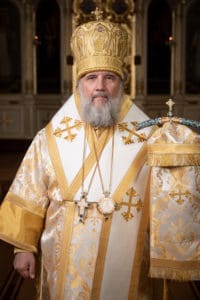Archpastoral Message of the Most Reverend
DANIEL
Archbishop of Chicago and the Midwest
on the Feast of the Nativity of Christ
Very Reverend and Reverend Fathers, Venerable Monastics, and Beloved Faithful,
Christ is born! Glorify Him!
 In the second chapter of the Gospel of Saint Matthew, we read the account of the Wisemen who came from the east, “Now when Jesus was born in Bethlehem of Judaea in the days of Herod the king, behold, there came wise men from the east to Jerusalem, saying, ‘Where is he that is born King of the Jews? For we have seen his star in the east, and have come to worship him” (Matthew 2:1-2). These wise men had left the comfort and routine of their daily lives to follow a star that would take them on what might have seemed to be an impulsive adventure, but which would lead them to the newborn King of the Jews and Savior of the World.
In the second chapter of the Gospel of Saint Matthew, we read the account of the Wisemen who came from the east, “Now when Jesus was born in Bethlehem of Judaea in the days of Herod the king, behold, there came wise men from the east to Jerusalem, saying, ‘Where is he that is born King of the Jews? For we have seen his star in the east, and have come to worship him” (Matthew 2:1-2). These wise men had left the comfort and routine of their daily lives to follow a star that would take them on what might have seemed to be an impulsive adventure, but which would lead them to the newborn King of the Jews and Savior of the World.
The star of Bethlehem was a sign sent from heaven, a part of God’s creation which played its unique role in the story of our salvation. This is even acknowledged in our liturgical hymns. As we sing in the Troparion of the Nativity: “Thy Nativity, O Christ our God, Has shone to the world the Light of wisdom! For by it, those who worshipped the stars, were taught by a Star to adore Thee, The Sun of Righteousness, and to know Thee, the Orient from on High. O Lord, glory to Thee!”
Throughout the centuries, men and women have studied the stars, their placement in the skies and their movement, seeking in them something greater, something different, looking, at times, for some source of life’s meaning. Even today, scientists look to the skies seeking answers to scientific questions and theories and hobbyists and amateur “star gazers” embrace astronomy as a valued pastime and relaxing diversion. If you have ever tried to use a telescope in a large metropolitan area, you are well aware of what is known as “light pollution,” i.e. artificial light that is produced by streetlights, buildings, cars, etc. Light pollution brightens the sky so much that it also dims the brilliance of the stars and makes it more difficult to see and appreciate their intensity, sometime even to locate them. It is only with a high-powered telescope or by traveling out into the desert or to a high mountain or some remote, unpopulated area that the stars can be clearly seen.
And so it is in our spiritual lives. We look beyond ourselves seeking the Light of Christ that “illumines all.” However, even in our seeking, we permit our spiritual vision to be dimmed by our own egos, self-will, lusts and passions, pettiness, and any number of “things” that are not beneficial or helpful to us. Only by going “into the desert” or “to the mountaintop” where such tendencies and things can be left behind that we can see the Light that will never dim. Only by ridding our lives of the false and artificial lights that distract us can our vision be clearer and more focused. As we celebrate Christ’s birth, it is my prayer that all of us can leave behind the “artificial light” that distracts us from the true Light of Christ.
In these difficult and seemingly dark days, of wars and rumors of war, as we strive to live lives of peace and harmony with all our brothers and sisters, and as we seek meaning in our daily lives and experiences, let us all keep our sights on the heavens, looking to Christ, whose Light illumines all. As we recall the Star that led the Wise Men to the Newborn King, let us and acknowledge that our only true goal is life lived in the Light of Christ- in this world and in the life of the world to come.
As celebrate the birth in the flesh of the Son of God, be assured of my prayerful best wishes for you, your families and friends, and all your dear ones. Let us pray for one another, for our God-protected Diocese, for our parishes, for this nation, and for all who seek peace on earth.
With love in Christ our Savior,
+Archbishop Daniel

